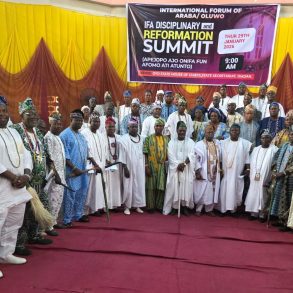By: BARR. SANWO OLUWATOBI IBRAHIM
The Lead Legal Consultant for the The Think Yoruba First (TYF) Ogo Adulawo Socio-Cultural Association issues this comprehensive rebuttal in response to growing distortions surrounding the proposed Indigeneship Bill currently under review by the Nigerian National Assembly. A recent article attempted to whitewash the implications of this bill, labeling legitimate Yoruba concerns as “faux outrage” and suggesting genuine ethnic advocacy is tantamount to tribal bigotry.
This narrative is not only grossly inaccurate but also intellectually dishonest. It gaslights, mischaracterizes, and trivializes the profound legal, historical, and cultural stakes involved for indigenous communities—not just in Yorubaland, but across Nigeria. This bill is a legislative Trojan horse that seeks to erase the constitutional and customary distinctions between citizenship and indigeneity, effectively commodifying ancestral identity.
In an unfortunate display of intellectual condescension, the referenced article attempts to delegitimize TYF’s opposition by branding it as “tribal sentiment” and alleging the group is “probably sponsored.” This tactic deliberately evades direct engagement with TYF’s legal, historical, and constitutional arguments.
Such reductionist language is designed to gaslight legitimate ethnic advocacy and suppress indigenous dissent under the false pretense of National Unity. It is a textbook attempt to moralize policy while criminalizing cultural identity.
There is a clear misuse of Section 25 and 42 of the 1999 CFRN (as Amended). The article’s core legal argument rests precariously on Section 25 (Citizenship) and Section 42 (Freedom from Discrimination) of the 1999 Constitution. However, it fails to mention that:
• Section 14(3) expressly recognizes the necessity of federal character— a structure that institutionalizes the diversity of Nigeria’s ethnic groups.
• Sections 36(12) and 315(5)(d) protect customary law and pre-existing cultural practices, which include indigene-based privileges.
• The Land Use Act of 1978, embedded in the Constitution, vests land control in State Governors, who hold it in trust for indigenous communities, not transient residents.
Thus, Nigeria’s constitutional design already accommodates indigenous rights within its federalist and multicultural ethos. Indigeneity is not a violation of equality; it is a protected legal and cultural status.
Simply stated, Indigeneity is Communal, Not National. The Indigeneship Bill collapses two very distinct legal concepts:
• Citizenship – conferred by the Federal Government, applicable nationwide to every citizen;
• Indigeneity – defined by communal descent, culture, and customary law, and enforced locally and subnationally
Conflating the two amounts to Cultural Erasure. A citizen of Nigeria has rights to live and work anywhere, but that does not confer Indigenous rights—like leadership of one’s Olace of Origin, Family Estates or Communal land inheritance, or chieftaincy or Obaship—within a community whose identity they do not share.
This attempted redefinition would allow any long-term resident to claim indigeneship, without any cultural or deep rooted linguistic integration. It is not unity—it is legalized dispossession. The National Assembly cannot legislate a Citizen to an Origin that has no originality— a new concept of “Counterfeit Indigenes” is about to emerge with the advent of a Bill that seeks to fix what was not broken.
Supporters of the bill frequently cite foreign policies on integration, such as jus soli in the United States or jus sanguinis in Europe. These comparisons are misleading and ignore the unique indigenous structures in Nigeria.
In countries like Canada, the United States, Australia, and Norway, indigenous peoples are given special constitutional recognition, including Exclusive land ownership, Cultural preservation, Autonomous governance and Protection from forced assimilation. To claim that the U.S. or Canada treats long-term residency as a path to indigenous status is a gross distortion. If anything, these countries are examples of how to protect indigenous rights, not abolish them.
The bill seeks to change the definition of “indigene” from ancestral descent to a 10-year combination of tax payment, and residency. This loophole invites Geo-Political infiltration, Cultural disruption, Electoral manipulation and Loss of control over traditional institutions that are now seeking constitutional roles over their kingdoms which are Lands. The right to declare who is who in Nigeria or who is a son of the soil cannot be bought through a decade of taxes— it must be inherited, embraced, and culturally affirmed by the host community.
Nigeria’s Land Use Act and Court precedents recognize customary land tenure as sacred and indigenous. This bill effectively transfers ancestral land and heritage to non-natives under the guise of integration.
Imagine a scenario where a resident who already has his own place of origin, now having lived in a community for ten years, suddenly becomes eligible for a sacred traditional stool, or Obaship or, Head of Family. This is not equality—it is internal colonization Family Structures which the smallest units of of society. It sets a precedent for the Federal Legislative to override the indigenous rights, a breach of Nigeria’s plural structure.
Under Nigeria’s Constitutional doctrine of Legislative Powers, issues not specifically listed in the Exclusive or Concurrent Legislative Lists are Residual Matters, which fall under State and Local Government jurisdiction. Indigene status—being inherently tied to customary law, land use, local chieftaincy, and community membership—clearly belongs in this residual category.
Therefore, the National Assembly lacks the constitutional authority to legislate a uniform federal indigene law applicable across diverse cultures and various ethnic-linguistic communities. To legislate indigeneity is to violate Nigeria’s federal architecture.
International Human Rights Violations
Nigeria is a signatory to several international treaties that protect indigenous peoples, including:
• UN Declaration on the Rights of Indigenous Peoples (UNDRIP):
a. Article 8: Right eg: against forced assimilation.
b. Article 25–26: eg; Exclusive rights over ancestral land and cultural practices.
• African Charter on Human and Peoples’ Rights:
a. Articles 19–24 eg; Cultural sovereignty and identity protection
This bill runs afoul of both, turning Nigeria into an international violator of indigenous rights.
Political Consequences: Electoral and Demographic Shifts
If passed, the bill opens the door to:
• Electoral displacement, where settlers run for indigenous offices.
• Land acquisition and gentrification, as seen in parts of Lagos.
• Violent conflict, replicating crises in Plateau, Benue, and Taraba.
The policy will strain interethnic harmony rather than nurture it.
The Way Forward: Mutual Coexistence Without Erasure. TYF Ogo Adulawo does not oppose unity. We oppose assimilation through legal erasure.
A viable alternative to this dangerous bill is to create a Resident Status Certificate, which allows non-indigenes equal access to employment, education, and public services—without stripping host communities of their ancestral identity. This preserves Nigeria’s delicate multi-ethnic balance while fostering dignity and peace.
The Indigeneship Bill is an existential threat to Nigeria’s indigenous communities and a betrayal of our federalist values. TYF will resist it legally, politically, and culturally. To be Yoruba is not just to live in Yoruba land—but to descend from it, preserve it, and pass it on. Indigeneity is not a commodity. It is a covenant.
Let Nigeria not legislate itself into cultural oblivion.






